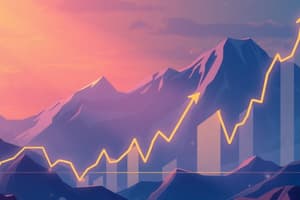Podcast
Questions and Answers
What does the unemployment rate measure?
What does the unemployment rate measure?
- The rate at which the general level of prices for goods and services is rising
- The balance between demand and supply of the labor force
- The percentage of the labor force actively seeking employment but cannot find work (correct)
- The total monetary value of final goods and services produced within a country's borders
Which indicator serves as a barometer of a country's economic health?
Which indicator serves as a barometer of a country's economic health?
- Public Debt
- Budget Deficit
- Inflation
- Gross Domestic Product (GDP) (correct)
What does Gross Domestic Product (GDP) represent?
What does Gross Domestic Product (GDP) represent?
- The rate at which prices are rising
- The total government spending
- Value of all final goods and services produced within a country (correct)
- The total unpaid government loans
Why is stable inflation considered healthy for an economy?
Why is stable inflation considered healthy for an economy?
Which indicator reflects the total amount owed by the government?
Which indicator reflects the total amount owed by the government?
What does the budget deficit indicate?
What does the budget deficit indicate?
What does a growing public debt signify?
What does a growing public debt signify?
Which scenario might a high unemployment rate coupled with a low GDP growth rate signal?
Which scenario might a high unemployment rate coupled with a low GDP growth rate signal?
What is a budget deficit?
What is a budget deficit?
How can excessive inflation impact an economy?
How can excessive inflation impact an economy?
Why is it essential to interpret economic indicators together?
Why is it essential to interpret economic indicators together?
What might high inflation rate coupled with low unemployment rate and high budget deficit suggest?
What might high inflation rate coupled with low unemployment rate and high budget deficit suggest?
Flashcards are hidden until you start studying
Study Notes
Indicators of Economic Performance
Understanding the health of a nation's economy requires tracking various key measures, or indicators, that help us glean essential insights. In this article, we'll explore several vital indicators that provide a snapshot of economic performance, focusing on unemployment rate, Gross Domestic Product (GDP), inflation, public debt, and budget deficit.
Unemployment Rate
The unemployment rate is the percentage of the labor force that's actively seeking employment but cannot find work. This figure offers crucial information about a country's economy as it indicates the demand for labor, the balance between supply and demand, and the state of employment opportunities. A high unemployment rate may signal an underperforming economy and can lead to socioeconomic challenges.
Gross Domestic Product (GDP)
GDP is the total monetary value of all final goods and services produced within a country's borders in a specific time period. This figure serves as a barometer of a country's economic health, with a higher GDP often suggesting a stronger economy. Economists use GDP to measure economic growth and compare it across countries.
Inflation
Inflation is the rate at which the general level of prices for goods and services is rising. A stable inflation rate is considered healthy because it indicates a growing economy with a balance between demand and supply. However, excessive inflation can erode the purchasing power of money and can also lead to economic instability.
Public Debt
The public debt is the total amount of money that a government owes to its creditors, including domestic and foreign investors. A growing public debt may signify an over-reliance on borrowing to finance government spending, which could be unsustainable in the long term. High levels of public debt may also strain the government's ability to respond to economic challenges.
Budget Deficit
A budget deficit is the difference between a government's expenditures and revenues during a specific period. A budget deficit occurs when a government spends more than it receives in revenue, and it is typically financed by borrowing. A persistent budget deficit can lead to rising public debt, which in turn may result in higher interest rates and economic instability.
Interpreting Indicators Together
While these indicators are often analyzed individually, it's essential to interpret them in conjunction with one another. A high unemployment rate may indicate an underperforming economy, but if coupled with a rapidly growing GDP, it could also suggest a period of economic transition. On the other hand, a high inflation rate might signal an overheated economy, but when paired with a low unemployment rate and a high budget deficit, it could also suggest excessive government spending.
To further understand the nuances of these indicators, let's consider a hypothetical scenario:
Let's imagine that a country has a high unemployment rate but a strong GDP growth rate. In this case, the high unemployment rate might be a temporary phenomenon, a reflection of the economy's structural challenges, or a response to a skills mismatch in the labor market. On the other hand, a high unemployment rate coupled with a low GDP growth rate might signal a longer-term structural problem in the economy.
Conclusion
Indicators of economic performance offer vital insights into the health of a country's economy and help economists and policymakers make informed decisions. By understanding the interplay between unemployment rate, GDP, inflation, public debt, and budget deficit, we can better assess economic performance and anticipate potential challenges and opportunities.
Studying That Suits You
Use AI to generate personalized quizzes and flashcards to suit your learning preferences.




